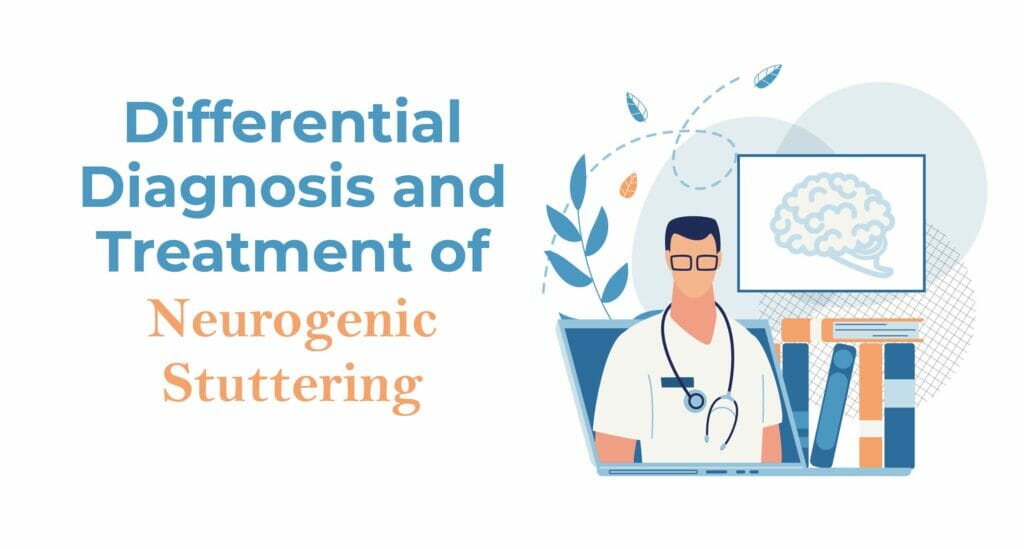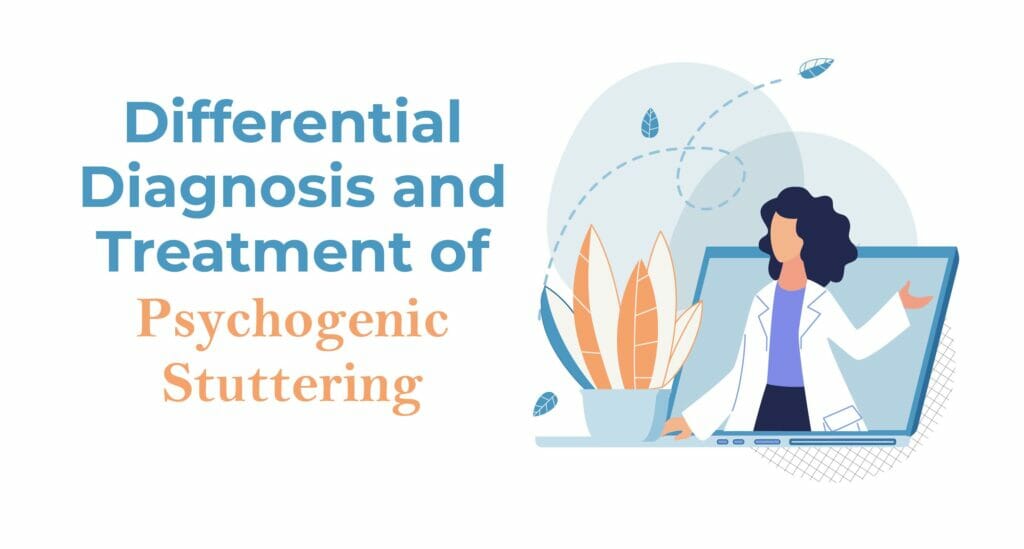Dysfluencies in speech can be developmental or acquired. Acquired dysfluencies can be of multiple types including neurogenic and psychogenic.
What is neurogenic stuttering?
Neurogenic dysfluency is mainly due to damage to the central nervous system (CNS). Modern research can associate neurogenic dysfluency with multiple areas and types of cerebral (brain) damage. It can be a result of direct brain trauma from accidents, disease(s) of the brain and/or spinal cord. More specifically, it can result from the damage or injury of the cerebellar region, cortex or subcortex of the brain, or the neural pathways.
Such diseases and injuries can include –
- Head trauma
- Cerebrovascular incidents (stroke)
- Ischemic attacks (temporary halting of blood flow to the brain)
- Cysts, tumours, and/or other neoplasms
- Encephalitis, meningitis, AIDS or Guillain-Barre syndrome
- Degenerative diseases of the brain or nervous systems like Parkinson’s, ALS or Multiple Sclerosis
- History of drug use or side effects of prescribed medication
In most of the cases, neurogenic dysfluencies arising from trauma or diseases of the brain or nervous system can be identified. In rare cases, individuals may show the presence of stuttering without any distinct indication of trauma or neurological damage.

What is psychogenic stuttering?
Psychogenic dysfluency or speech disorders include a broad category of speech fluency problems that may arise from the manifestation of one or more psychological processes. It is a less-researched and even lesser-talked about area of speech dysfluencies since speech disorders are typically difficult to be categorized into psychological or psychosomatic.
A person might have both speech disorders and psychological disturbance(s). However, it does not mean that the person has a psychogenic disorder. For example, a person with a typical voice disorder may suffer from anxiety or depression. That does not mean the cause of their voice disorder stems from their depression or anxiety. The voice disorder may be explainable by differences in the structure of their vocal cord(s).
The causes of psychogenic speech disorders including psychogenic stuttering can include –
- Depression
- Conversion disorders
- Emotional response(s) to traumatic events
- Anxiety
In fact, it can include any psychological disorder that interferes with the individual’s voluntary control of speech or a component of speech. These can be perceived as dysfluencies like stuttering or changes in voice.

Who can experience neurogenic stuttering?
Neurogenic stuttering can develop after brain trauma or disruption of the neural connections in the brain. Therefore, it does not have a particular age of onset.
In most cases, neurogenic stuttering occurs in those who have had a fluent speech in the past. Some may have experienced developmental stuttering but recovered in their adulthood. Although it can occur at any age, it has the highest incidence in the geriatric population.
Differential diagnosis of neurogenic stuttering

There are a few characters that help in distinguishing neurogenic stuttering from other forms of stuttering –
- Repetitions, blocks and repetitions can occur at any position of the word as opposed to developmental stuttering where dysfluencies only occur at the beginning of the word.
- The speaker may experience annoyance, but they do not appear overly anxious about their fluency problem.
- There is an absence of an adaptation effect
- Secondary symptoms common in developmental stuttering are almost absent.
Treatment of neurogenic stuttering
Like every other form of stuttering, neurogenic stuttering calls for the intervention of a speech-language pathologist (SLP). Since a huge spectrum of neuropathologies can cause stuttering, the intervention of only an SLP is not enough.
One of the tell-tale signs of neurogenic stuttering is that the same person had fluent speech before the accident or incident or the manifestation of the disease. Therefore, the treatment of neurogenic stuttering requires diagnosis by neurologists.
The evaluation includes the assessment of the fluency problem by the SLP as well as the neurologist. The person’s case history, communication impairments and medical status play a significant role in the diagnosis as well as the treatment of neurogenic stuttering.
- Non-pharmacological treatments include delayed auditory feedback (DAF) that decreases the rhythm of speech to improve fluency.
- Frequency Altered Auditory Feedback (FAF) is another technique that uses pitch distortion to create the “feeling” that someone else is saying the speaker’s speech in another voice.
- Masking Auditory Feedback (MAF) is another non-pharmaceutical technique which adds external noise to the speaker’s voice so that the speaker can no longer hear their voice.
The studies on these methods to treat neurogenic stuttering are rare. However, treatment of the cause (trauma, lesion or disruption of neural pathways in the CNS) can relieve neurogenic stuttering in mid-aged adults.
The treatment of neurogenic stuttering in the geriatric population due arising due to degenerative conditions of the brain or CNS is often more difficult to treat, especially since there is little evidence of pharmacological treatment working in favour of the patients.
Who’s at risk for developing psychogenic stuttering?
There is no particular age group for developing psychogenic stuttering. It can begin abruptly even in people without any history of developmental stuttering.
Psychogenic stuttering typically results from emotional trauma and even from emotional stress. It is often difficult to diagnose psychogenic stuttering since it has no particular age for onset.
Moreover, two different individuals experiencing the same or similar trauma may not develop stuttering together. In fact, one of them might never develop stuttering at all.
Differential diagnosis of psychogenic stuttering

Diagnosing psychogenic stuttering can be challenging even for the most experienced SLPs and psychologists. According to Roth, Aronson and Davis (1989), psychogenic stuttering has a few common characteristics –
- Psychogenic stuttering mainly affects phonation and articulation
- A history of psychological stress or trauma before the onset of stuttering
- Atypical dysfluencies – repetition of stressed syllables with little response to choral reading, DAF, FAF or white noise.
- No secondary behaviours like avoidance or escape like in case of developmental stuttering
- The presence of la belle indifference (the person is unphased or unaware of their stuttering)

Treatment and counselling of psychogenic stuttering
In the case of psychogenic stuttering, the SLP of the patient has to collaborate with their psychologist, psychiatrist or neuro-psychiatrist and other healthcare professionals who can draw up a complete history of the patient’s health, medical and surgical data.
The SLP’s role while treating a client with psychogenic stuttering is that of the communication counsellor. It includes a detailed discussion of how the individual’s psychogenic stuttering has impacted their ability to communicate.
Depending on the primary symptoms the client shows, the SLP can and will use different non-pharmacological treatment techniques. For example –
- The SLP can recommend a manual laryngeal musculoskeletal reduction technique if the client’s primary symptom involves changes to the voice. The therapist may also recommend the use of abdominal breathing exercises.
- Speech modification strategies like changing the timing of pauses between the words and syllables can also work.
- The SLP may try different postural changes of the jaw to relieve the tension that may be contributing to the stuttering.
The treatment of psychogenic stuttering calls for an SLP along with mental health counsellors or psychologists, irrespective of the age of the client. Even children can experience psychogenic stuttering, which can be difficult to distinguish. If stuttering appears suddenly in children between the ages of 5 and 10, it might be psychogenic in nature. However, it is critical to consult a speech therapist to get a differential diagnosis. Parents must never assume the nature of stuttering in children before approaching for treatment.
Both neurogenic and psychogenic stuttering are forms of acquired stuttering. They exhibit disorders of rhythm of speech in the forms of involuntary blocks, repetitions and prolongations of sounds.
There are several superficial similarities between psychogenic and neurogenic stuttering. The role of an SLP is critical in the development of a treatment plan for anyone suffering from any form of acquired stuttering.










